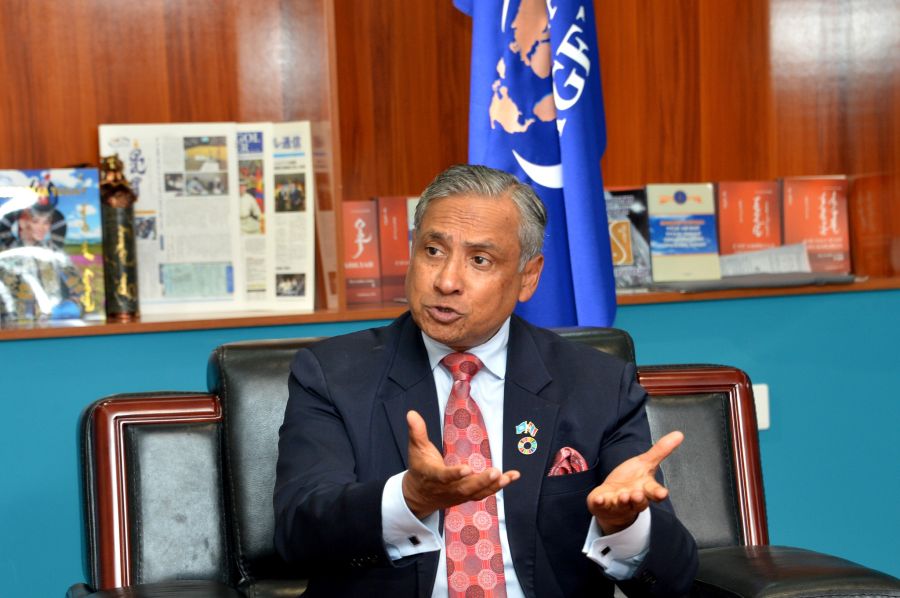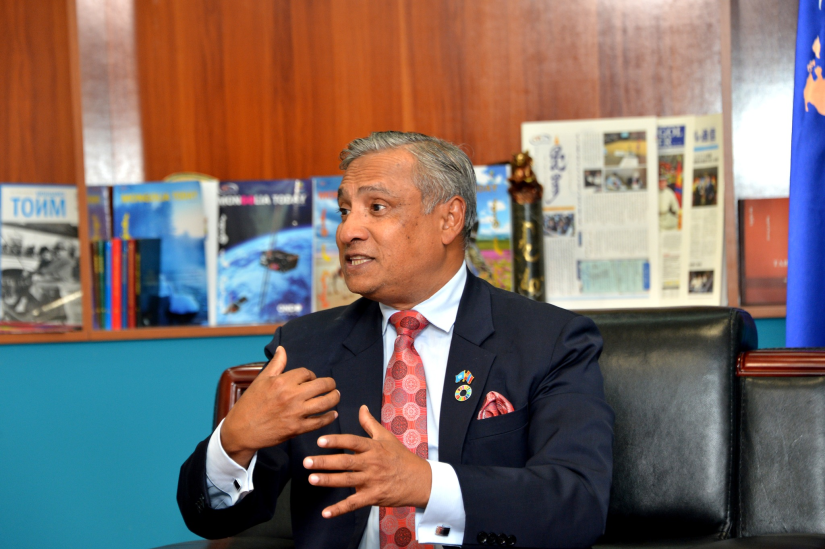Tapan Mishra: Mongolia is a Role Model for Gender Equality and Women's Empowerment

Ulaanbaatar, August 16, 2024 /MONTSAME/. Mongolia will host the World Women’s Forum 2024 in Ulaanbaatar on August 22-23, 2024. In this regard, MONTSAME Mongolian National News Agency spoke with Mr. Tapan Mishra, the UN Resident Coordinator in Mongolia.
-The World Women's Forum in Ulaanbaatar under the theme “Towards a Green Future” is indeed a unique opportunity for women leaders, politicians, entrepreneurs, and social activists from around the world to engage in critical dialogues. How is the United Nations collaborating with Mongolia to support this Forum?
-We are supporting the World Women’s Forum at all levels: programmatic, organizational, strategic, and outcome-related. At the organizational level, the World Women’s Forum 2024 will be held under the auspices of the President of Mongolia, with the Government of Mongolia taking the lead through the Ministry of Foreign Affairs of Mongolia. They requested that the UN in Mongolia join in co-organizing the Forum, and we have been collaborating with them since early this year. The World Women’s Forum will discuss six sessions on environment and climate change, food systems, economy, industry, education and culture, and sports and arts. We have worked closely with UN agencies on every aspect of these sessions, including designing the structure, selecting panel members, and developing content that effectively addresses women's empowerment challenges within each topic.
At the outcome-related level, we aim at building a global platform through the strategic engagement of each speaker and panelist, as well as through substantive discussions, to bring out the outcome of SDG 5—women’s empowerment through gender equality. We envision the World Women's Forum to emerge with clear outcome statements and actionable directions on fostering gender equality and women’s empowerment, thereby contributing to achieving the Sustainable Development Goals and promoting inclusive and sustainable development for all countries, with Mongolia serving as a role model.
-What are the expected outcomes of the Forum, and how can we effectively translate the outcomes and recommendations into actionable strategies and measurable progress?
-Outcomes, of course, occur after an event. However, we're expecting the outcomes of the Forum. We've designed each session to produce clear recommendations and a pledge or declaration. This will ensure tangible results across all areas: climate change and environment, food systems, women's economic empowerment, industry development, sports and culture, and education.
In the realm of women's leadership as well, we anticipate a clear deliverable. I cannot foretell you the outcome right now because it has to be deliberated during the sessions. It will be announced after the World Women's Forum, and then you can interview me again.
I believe the overall outcome will be a clear declaration and statement outlining the role we want to see women leaders play in driving empowerment and gender equality towards achieving the Sustainable Development Goals and beyond, globally. This will include clear, actionable goals to be defined in this Forum, which will contribute to other major international platforms, such as Beijing +30 and the Commission on the Status of Women (CSW) that convenes annually in New York. The World Women's Forum will establish a clear sense of direction, agreed upon by global women leaders. This includes representatives from the UN, such as the UN Deputy Secretary-General and heads of UN agencies, as well as presidents of countries like Slovenia, along with ministers and members of the Parliament of Mongolia. In addition, social activists, entrepreneurs, industrialists, private sector representatives, and civil society members will come together, raising their voices to create a common outcome.
-How do you view Mongolia's role in advancing the global agenda on gender equality and environmental sustainability?
-By expressing willingness and showing its ability to host the World Women's Forum, Mongolia is demonstrating strong leadership in voicing its commitment to women’s leadership. On the aspect of women’s empowerment and gender equality, Mongolia has a very positive outlook and aims at raising the bar on these issues. However, it is still uncertain, as Mongolia faces challenges such as gender-based violence, severe environmental and climate change issues like desertification and land degradation, and the impacts of rural-urban migration, all of which disproportionately affect women. There are many issues in Mongolia, but we are focusing on two facets: what is relevant for Mongolia and what is relevant for the whole world. We aim at promoting Mongolia's commitment to women’s leadership, empowerment, and gender equality, positioning the country as a role model to the world in leading these discussions toward outcomes and actions to achieve better results in advancing gender equality and women’s empowerment.
-Mongolia has made significant strides in promoting gender equality and empowering women, as reflected in the recent constitutional amendment mandating that 30 percent of the Parliament be held by women. So, how do you assess Mongolia's progress towards achieving gender-related SDGs, and what areas require more focused efforts?
-This is a good question. I am very proud and happy that Mongolia has passed this law to increase the participation of women in Parliament. Previously, women made up 17.2 percent of the 76 members, which was about 13 representatives. Now, with the new law, Mongolia has raised the bar to 30 percent. With the expanded Parliament now consisting of 126 members, the country currently has 32 women, which is 25.2 percent of the Parliament. I look forward to Mongolia becoming a role model in this regard. We are now close to regional and global standards with 25.2 percent but if we reach 30 percent and achieve a quota of 40 percent by the next election, we will be narrowing the gap towards gender equality and parity in the Parliament and Government. This is a very promising sign and a strong symbol of progress.
One area for improvement is the electoral process. Although we had both proportional and representational systems in the recent election, it is noticeable that only a few candidates were elected directly by the people. Many were nominated by their parties. I want to use this opportunity to encourage the citizens of Mongolia to have confidence in electing women leaders who will represent them in the Parliament rather than just representing their parties. It's essential to cultivate a belief in women's ability to effectively deliver on the development agenda, just as their male counterparts do. This would be a significant improvement.

Second, we need to address the gender imbalance beyond the Parliament. Despite 72 percent of women in Mongolia holding tertiary education, a significant disparity persists in the workplace. Women are disproportionately represented in lower and middle-level positions across both the private and public sectors. I am eager to witness equality across the entire organizational pyramid, with women occupying more decision-making roles at the top.
Another crucial area for improvement is enhancing women's engagement not only in empowerment initiatives but also in resolving gender-based violence. It is imperative that we instill a culture of respect for both men and women from childhood to adulthood. This means fostering equality in early education, schools, colleges, universities, and workplaces. By promoting respect and equal opportunities from a young age, we can work towards eliminating gender-based violence and biases. Our goal should be to create a society where both men and women have equal opportunities and respect each other as equals, contributing to a more just and empowered community.
-One of the Forum's key sessions discusses the role of women in accelerating environmental actions. How can the United Nations support Mongolia in harnessing women's leadership to mitigate environmental challenges and promote sustainable practices?
-It has been observed that women are more vulnerable to environmental challenges or disasters. They bear the brunt of the impact, as they are mainly responsible for tasks such as carrying wood or fetching water when resources are scarce.
In the context of Mongolia's dzud disaster, where we experienced significant livestock losses and subsequent socioeconomic challenges, we must shift our focus from response to resilience. We should empower communities, particularly women, by changing some behaviors and mindsets to improve environmental, climate, and biodiversity actions, as well as disaster response. Women should not be victims or beneficiaries; they should be equal partners and contributors in policymaking, its implementation, and results. The UN stands ready to work with the Mongolian Government and stakeholders to ensure women's full participation in addressing these challenges.
-Looking ahead, what do you see as the biggest challenges and opportunities for advancing gender equality? How can international cooperation play a role in overcoming these challenges?
-Gender equality is not a new concept; it has been a focus for generations. We have transitioned from an era rooted in agrarian or herder societies, where people primarily hunted, herded, or farmed, to a more urbanized world. In the past, physical strength was the most valued asset, giving men a dominant role. Later, economic power became the driving force, with men often holding the majority of that power. Today, however, we find ourselves in a knowledge-driven, digital, and information-based world, where the playing field between men and women is more level. In many cases, women may even have an advantage due to their capacities and often more developed emotional intelligence.
In this transition, we haven't fully recalibrated the roles of men and women in a gender-empowered world, where both are equally educated—sometimes women even more so than men. We must cultivate a mindset that fosters an enabling environment for women, allowing them to participate at the same level as men and enjoy equal privileges and opportunities.
In this new digital, information, and knowledge-driven world, we must begin creating an empowering environment from early childhood, through schooling, college, and into the workplace. This will enable men and women to work together as two wheels of the vehicle, balancing their contributions and leveraging each other’s strengths to build a more robust and powerful engine for growth and change. By doing so, we can create a better future for this generation and the generations to come.
The UN stands ready to collaborate with the Government of Mongolia and all stakeholders to make gender equality and women’s empowerment a reality in every way.
-Is there anything you would like to share about the World Women’s Forum 2024?
-To all Mongolian citizens: I call upon you to pay close attention and not treat this Forum as just another event. Held under the auspices of the President of Mongolia and hosted by the Ministry of Foreign Affairs of Mongolia, this is a significant gathering of all relevant stakeholders.
I encourage you to engage actively in the dialogues of the Forum. Please show interest, follow the Forum closely, and add your voices. There will be ample opportunities in the media and on social media to express your thoughts. We also have the opportunity to bring these discussions to the Summit of the Future in New York this September.
The UN is hosting various events, including those for youth, women, and children, leading up to a national forum that will contribute to sustainable development at the summit. I encourage you to use these opportunities to share your constructive ideas on how to achieve gender equality and women's empowerment, ensuring that women leaders' voices are heard clearly—not just in Mongolia but around the world.
Let’s move from words to actions, turning our discussions into tangible results to create a better, greener, and more vibrant future for all Mongolians and citizens worldwide. This is my humble expectation, and I sincerely hope that all citizens of Mongolia will join us on this journey to successfully organize the World Women's Forum and achieve outcomes that will help build a better world. Thank you.
-Thank you!






